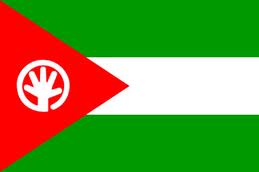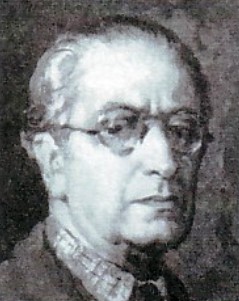Related Research Articles

Andalusia is the southernmost autonomous community in Peninsular Spain. It is the most populous and the second largest autonomous community in the country. It is officially recognised as a "historical nationality". The territory is divided into eight provinces: Almería, Cádiz, Córdoba, Granada, Huelva, Jaén, Málaga, and Seville. Its capital city is Seville. The seat of the High Court of Justice of Andalusia is located in the city of Granada.

The Andalusian Party was an Andalusian nationalist centre-left political party from Andalusia (Spain), with an important presence in provinces such as Cádiz and Seville although in the past they have stood in other provinces and even won seats in Barcelona to the Parliament of Catalonia.

The Andalusians are a European ethnic group, native to Andalusia, an autonomous community in southern Spain. Andalusia's statute of autonomy defines Andalusians as the Spanish citizens who reside in any of the municipalities of Andalusia, as well as those Spaniards who reside abroad and had their last Spanish residence in Andalusia, and their descendants. Since reform in 2007, the Andalusian statute of autonomy identifies the territory as a historic nationality in the preamble. The Spanish Language Academy recognizes Andalusian Spanish as a set of diverse dialects.

Andalusian nationalism is the nationalism that asserts that Andalusians are a nation and promotes the cultural unity of Andalusians. In the past it was considered to be represented primarily by the Andalusian Party. However, the party disbanded in 2015; there are also lesser political organisations that identify with Andalusian nationalism. Some political forces without parliamentary presence like Nación Andaluza and Asamblea Nacional de Andalucía may be found advocating independence.

Blas Infante Pérez de Vargas was a Spanish Andalusist politician, Georgist, writer, historian and musicologist, known as the father of Andalusian nationalism (Padre de la Patria Andaluza).

Gustavo Bacarisa (1873–1971) GMH was a Gibraltarian painter. He was born in Gibraltar and died in Seville, Spain. His work, of a figurative style and varied themes, is characterised by the rich use of colour.

The Assembly of Ronda or Assembly of the Andalusian Provinces in Ronda was a gathering of Andalusian nationalists convoked by the Centros Andaluces in Ronda, Province of Málaga in January 1918. It was the first Andalusian regionalist gathering to adopt what Blas Infante called "the insignia of Andalusia", now the flag and emblem of the autonomous community of Andalusia.
The Assembly of Córdoba was an autonomist assembly of the Junta Liberalista de Andalucía, which advocated the abolition of centralized political power in Spain and the creation instead of a Spanish Federation. It took place January 1, 1919.

The Statute of Autonomy of Andalusia is a law hierarchically located under the 1978 Constitution of Spain, and over any legislation passed by the Andalusian Autonomous Government. During the Spanish transition to democracy, Andalusia was the one region of Spain to take its path to autonomy under what was called the "vía rápida" allowed for by Article 151 of the 1978 Constitution. That article was set out for regions like Andalusia that had been prevented by the outbreak of the Spanish Civil War from adopting a statute of autonomy during the period of the Second Spanish Republic. Following this procedure, Andalusia was constituted as an autonomous community February 28, 1980. The regional holiday of the Andalusia Day commemorates that date. The statute was approved the following year by the Spanish national government.
The copla,copla andaluza, canción andaluza, canción española, tonadilla or canción folklórica is a form of Spanish popular song, deriving from the poetic form of the same name. Although the genre has a long heritage, it flourished in the 1930s and 1940s, and is epitomized by songwriters Antonio Quintero, Rafael de León and Manuel Quiroga.

The 1982 Andalusian regional election was held on Sunday, 23 May 1982, to elect the 1st Parliament of the autonomous community of Andalusia. All 109 seats in the Parliament were up for election.

Museo José Cruz Herrera is a museum in La Línea de la Concepción, Spain. Established in 1975, it is named after the portrait artist José Cruz Herrera.
Juan Emilio Gutiérrez Berenguel is a Spanish cyclist. He competed at the 2009 Paralympic World Championships Road Cycling where he earned a pair of medals. He represented Spain at the 2012 Summer Paralympics where he earned a Paralympic diploma.

Amparo Rubiales Torrejón is a Spanish politician who belongs to the political party PSOE and is ex-counsellor of the Junta de Andalucía. She holds a PhD in Laws, and is a lawyer and Senior Lecturer of Administrative Law at the University of Seville.
Eva Díaz Pérez is a Spanish journalist and writer. She is also a teacher of cultural journalism at the EUSA University Center and a lecturer. She has received the Andalusian Journalism Award, and in July 2019 she was appointed director of the Centro Andaluz de las Letras (CAL).

Andalucía por Sí is an Andalusian nationalist political party founded in 2016, succeeding the late Andalusian Party. Its results in regional and general elections have been mostly residual, but at the local it holds more than 100 councilors and several mayorships.
The Andalusian Army was a unit of the Spanish Republican Army that operated during the Spanish Civil War. Under its jurisdiction were the republican forces deployed in Eastern Andalusia.

Andaluces Levantaos was an Andalusian-based electoral alliance formed by Más País, Andalucía por Sí (AxSí) and Andalusian People's Initiative (IdPA) to contest the 2022 Andalusian regional election. The alliance aimed at representing ecologist, feminist and social democratic voters.
The Campeonato Regional Sur, sometimes known as the Copa de Andalucía, was an annual association football competition for clubs based in the Andalusia region of Spain between 1915 and 1940, organised by the Southern Football Federation.

Por Andalucía is an Andalusian-based electoral alliance formed by Podemos, United Left/The Greens–Assembly for Andalusia (IULV–CA), Equo, Green Alliance (AV), Más País and Andalusian People's Initiative (IdPA) to contest the 2022 Andalusian regional election. The alliance was launched after over two months of negotiations between the parties to the left of the Spanish Socialist Workers' Party of Andalusia (PSOE–A), in an attempt to form a joint list that avoided wasted votes; however, both the new Adelante Andalucía party of Teresa Rodríguez, as well as the Andalusian Andalucía por Sí (AxSí)—which had been a founding member of the Andaluces Levantaos alliance between Más País, IdPA and itself—rejected joining in.
References
- Augustín Luis Robledo, Una mirada casi herética al andalucismo histórico, Estudios Regionales, Number 27 (1990), pp. 137-154.